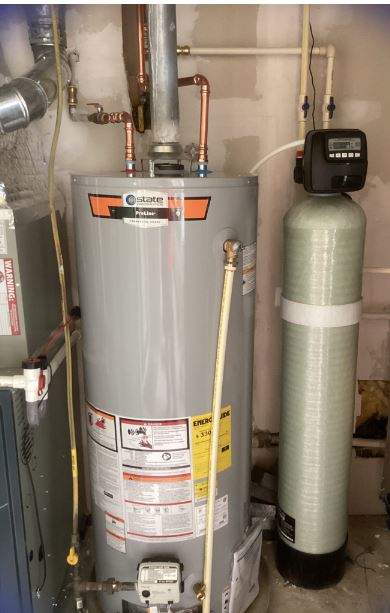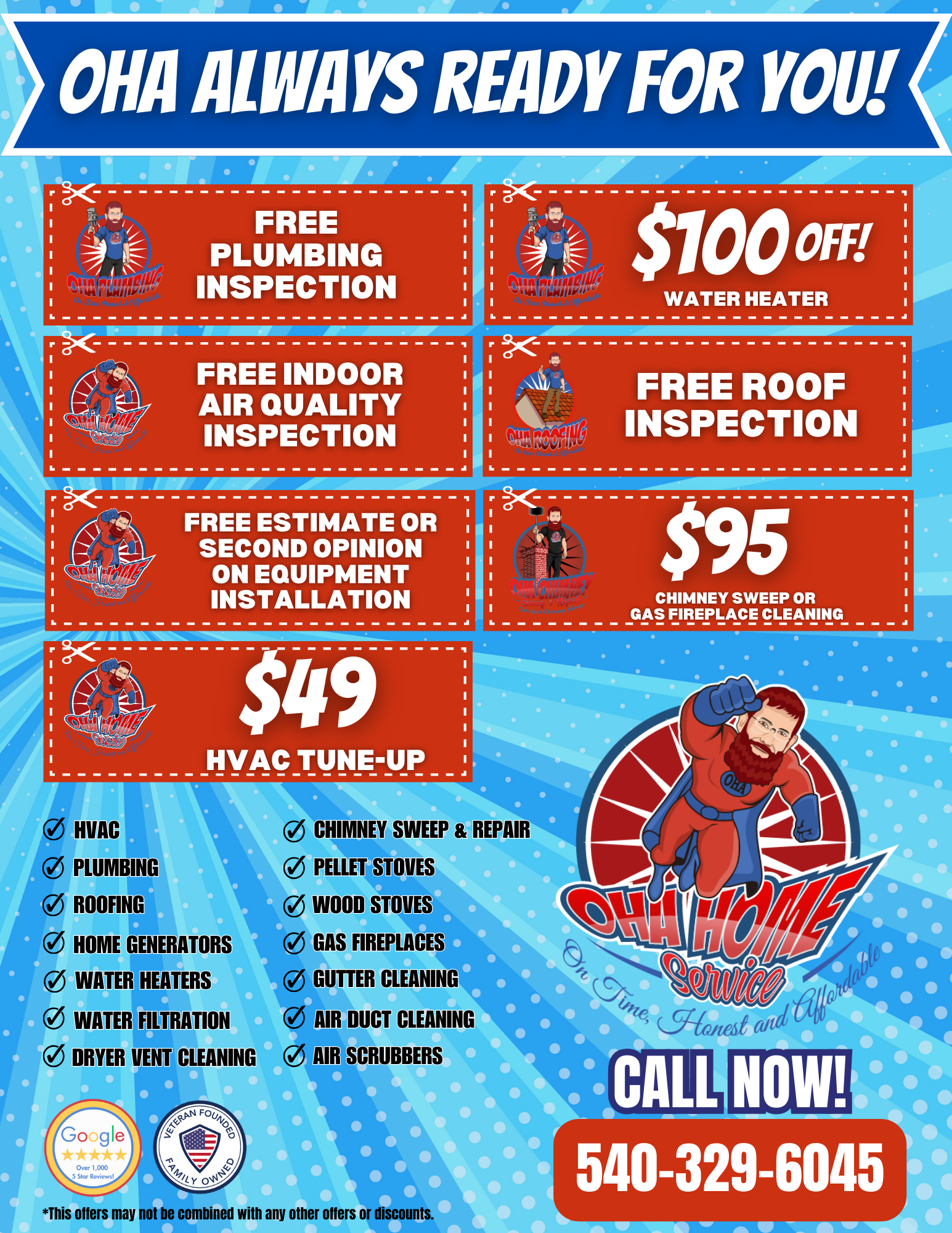Hello, savvy homeowner! You’re about to embark on a journey toward warm showers and energy savings with a new water heater installation. But before diving in, let’s paddle through the top five considerations to ensure you get the comfort and cost-efficiency you deserve.
1. Understanding Your Water Heating Needs
When it comes to water heater installation, the first crucial step is understanding your specific water heating needs. You don’t want to end up with a water heater that leaves you shivering in the middle of your shower or one that blows your budget. Let’s delve deeper into this essential aspect to ensure you make the right choice.
Family Size and Water Usage
Consider your family size and daily water usage habits. Are you a household of four with a habit of long, luxurious showers, or perhaps a smaller family with more conservative water habits? The size of your family and the number of appliances that rely on hot water play a pivotal role in determining the capacity of the water heater you need.
In essence, the more people and appliances you have, the larger your water heater should be. Properly sizing your water heater ensures that you’ll never have to endure the disappointment of a prematurely cold shower. It’s all about ensuring a continuous supply of hot water to meet your family’s demands.
Choosing Your Water Heater Type
Next, you’ll need to decide on the type of water heater that best suits your needs. There are various options available, each with its own set of advantages and disadvantages.
Tank vs. Tankless
One fundamental choice is between tank and tankless water heaters. Tank water heaters store and continuously heat a specific volume of water, whereas tankless water heaters heat water on-demand as it flows through the unit.
Tankless water heaters are known for their space-saving design and energy efficiency. They only heat water when you need it, reducing energy wastage. However, they tend to have a higher upfront cost. On the other hand, tank water heaters are typically more affordable initially but may lead to higher energy bills due to constant heating.
Gas vs. Electric
Another decision point is whether to opt for a gas or electric water heater. Gas heaters are renowned for their ability to heat water quickly and are often favored for larger households. Electric models, on the other hand, are generally easier to maintain and may be a better choice if you have limited access to natural gas.
Space Logistics
Finally, before proceeding with your water heater installation, consider the physical space where your new system will be located. Sometimes, upgrading your water heater means playing a little game of ‘find the space.’
Check whether your new unit will fit seamlessly into the location where the old one was. This may require assessing available space in a closet, garage corner, or other suitable areas. Ensuring that you have enough room to accommodate your new water heater is essential for a smooth installation process.
By understanding your water heating needs, choosing the right type of water heater, and ensuring that you have the necessary space for installation, you’ll be well-prepared to embark on your journey toward a more comfortable and cost-efficient hot water supply.
2. Energy Efficiency and Cost-Effectiveness
When it comes to water heater installation, considering energy efficiency and long-term cost-effectiveness is a savvy move that not only benefits your wallet but also the environment. Let’s dive into the details to help you make an informed decision that keeps both your savings and sustainability in mind.
Understanding Efficiency Ratings
Efficiency ratings are the compass guiding you towards a more economical and eco-friendly water heater. These ratings are akin to the GPA (Grade Point Average) for your water heater’s performance, and the higher they are, the better. Understanding them is key to choosing an energy-efficient model.
Energy Factor (EF) and Uniform Energy Factor (UEF)
Two vital efficiency ratings to be aware of are the Energy Factor (EF) and the Uniform Energy Factor (UEF). These ratings measure how effectively a water heater converts energy into hot water, offering valuable insights into its efficiency.
The Energy Factor (EF) typically applies to conventional tank water heaters, while the Uniform Energy Factor (UEF) is used for tankless and heat pump water heaters. Both ratings consider factors like standby heat loss, cycling losses, and recovery efficiency.
In simple terms, a higher EF or UEF rating indicates that the water heater is more efficient in turning the energy it consumes into hot water. Investing in a model with a higher rating might involve a slightly higher upfront cost, but it pays off handsomely in the long run through reduced energy consumption and lower utility bills.
Weighing Costs and Savings
Now, let’s address the financial aspect of energy-efficient water heater models. While it’s true that these models may have a somewhat higher initial price tag, it’s a classic tale of spending a little more now to save a significant amount later.
Enticing Rebates
One of the perks of choosing energy-efficient models is the potential for enticing rebates and incentives. Many utility companies and government programs offer financial rewards for upgrading to energy-efficient appliances, including water heaters. These rebates can help offset the initial cost and accelerate your return on investment.
Monthly Bill Reduction
Energy-efficient water heaters are champions at trimming your monthly utility bills. Their ability to heat water more efficiently means less energy is wasted, resulting in substantial savings over time. Imagine the satisfaction of opening your reduced energy bills month after month, knowing that your choice is paying off.
Long-Term Investment
Think of an energy-efficient water heater as a long-term investment. While you may spend a bit more upfront, the return on investment accumulates over the years. It’s like putting your money into a high-yield savings account – you’ll appreciate the dividends down the road.
When contemplating a water heater installation, don’t merely focus on the immediate costs. Embrace the concept of energy efficiency and cost-effectiveness as your guiding principles. Understanding efficiency ratings, exploring available rebates, and anticipating long-term savings are crucial steps in ensuring that your water heater not only warms your home but also keeps your wallet snug and the environment happy.
3. Selecting the Right Contractor
When it comes to water heater installation, the choice of the right contractor is paramount. A skilled and reliable professional can turn your installation into a smooth and trouble-free experience. On the other hand, a subpar installer can quickly turn it into a nightmare. Let’s explore the essential aspects of selecting the right contractor for your water heater installation.
The Importance of Professional Installation
Water heaters are not simple appliances; they are complex creatures that require precision and expertise to install correctly. Here’s why professional installation is a must:
Complex Systems
Water heaters involve intricate systems, including gas lines, electrical connections, and plumbing components. An experienced installer understands the nuances of these systems and can navigate them with grace. They can ensure that everything is correctly connected, minimizing the risk of leaks, gas-related issues, or electrical hazards.
Warranty Protection
Professional installation is often a prerequisite to maintaining your water heater’s warranty. Manufacturers typically require that their products are installed by certified professionals to ensure that the unit is set up correctly. Failure to comply with these installation requirements can void your warranty, potentially leaving you with significant repair costs down the road.
Finding a Qualified Installer
To ensure a successful water heater installation, follow these steps to find a qualified installer:
Check for Licenses and Insurance
First and foremost, verify that the installer holds the necessary licenses and insurance. This step is non-negotiable. Proper licensing demonstrates that the contractor has met the required standards and regulations for performing water heater installations in your area. Insurance is essential to protect you and your property in case of any unexpected accidents or damage during the installation process.
Seek Recommendations and Read Reviews
Word-of-mouth recommendations are valuable when searching for a trustworthy installer. Ask friends, family, or neighbors who have recently had water heater installations for their experiences and recommendations. Their insights can be particularly helpful in identifying reliable contractors.
Additionally, read online reviews and testimonials about local installers. Websites and platforms like Yelp, Google Reviews, and Angie’s List can provide valuable information about the quality of service provided by contractors in your area. Look for patterns of positive feedback and consistent professionalism.
Communication is Key
During the quoting process, pay attention to the level of communication and responsiveness from the contractors. A professional installer should be willing to answer your questions, provide explanations, and address any concerns you may have about the installation. Effective communication is a sign of a contractor who values transparency and customer satisfaction.
Selecting the right contractor for your water heater installation is a critical step in ensuring the success and longevity of your system. Professional installation not only safeguards your warranty but also guarantees that your water heater operates efficiently and safely. By verifying licenses and insurance, seeking recommendations, reading reviews, and engaging in clear communication with potential contractors, you can make an informed choice that turns your water heater installation into a hassle-free and reliable experience.

4. Legal and Safety Considerations
While the legal and safety aspects of water heater installation might not be the most exciting part of the process, they are crucial. Think of permits, building codes, and safety measures as the protective armor for your installation project. Skipping these essential steps is simply not worth the risk.
Permits and Building Codes
The Permit Requirement
One of the first legal considerations for your water heater installation is the necessity of obtaining a permit. Some local authorities mandate obtaining a permit when installing a new water heater, but not always.
Adherence to Building Codes
Equally vital is ensuring that your water heater installation complies with local building codes. These codes are in place to establish minimum safety and performance standards for various construction and installation projects, including water heaters.
Failure to adhere to building codes can have serious consequences. It might result in unsafe installations, damage to your property, or even potential hazards like gas leaks or electrical issues. Non-compliance could also lead to unwelcome visits from city inspectors and costly corrections to bring your installation up to code.
Safety Issues and Precautions
Proper Ventilation
Proper ventilation is a non-negotiable aspect of water heater safety. Efficient ventilation ensures that any combustion byproducts, such as carbon monoxide, are safely vented outdoors rather than accumulating in your home. Carbon monoxide is a colorless, odorless gas that can be deadly if not properly vented, making the presence of a working carbon monoxide detector essential.
Your installer should assess the ventilation requirements for your specific water heater and ensure that the system is correctly set up to prevent any potential hazards associated with poor airflow.
Gas Lines and Electrical Work
Precise work with gas lines and electrical connections is paramount for the safety of your water heater installation. Gas leaks or faulty electrical connections can lead to fires, explosions, or other hazardous situations.
A qualified installer will have the expertise to handle gas lines with the utmost care, ensuring secure connections and leak-free operation. Similarly, they should possess the skills to manage electrical components safely, minimizing the risk of electrical issues or short circuits.
Carbon Monoxide Detectors and Safety Valves
In addition to proper ventilation, installing carbon monoxide detectors is a proactive safety measure. These detectors can alert you to the presence of this silent killer, allowing you to take immediate action to protect yourself and your family.
Safety valves, such as pressure relief valves, are another layer of protection. They help regulate pressure within the water heater and prevent dangerous overpressure situations. Regular maintenance and testing of these safety devices is always crucial to ensure their effectiveness.
The legal and safety considerations of water heater installation are not to be overlooked. Obtaining the necessary permits, complying with building codes, ensuring proper ventilation, and prioritizing gas and electrical safety measures are fundamental to a successful and secure installation. By adhering to these guidelines, you can enjoy the benefits of your water heater without the looming threat of safety hazards or legal issues.
5. Future Maintenance and Upkeep
Installing a water heater is a significant commitment, akin to adopting a pet. It’s not a one-and-done affair but rather a long-term relationship that requires care and attention. Let’s explore the key aspects of future maintenance and upkeep for your water heater installation to ensure it remains efficient and reliable throughout its lifespan.
Warranty and Service Expectations
Manufacturer’s Warranty
Understanding the warranty coverage for your water heater is a crucial first step. Most manufacturers offer warranties that vary in duration and coverage. Familiarize yourself with the specifics of your water heater’s manufacturer’s warranty. This will help you know what’s covered in case of defects or malfunctions within the warranty period.
Installer’s Guarantee
Additionally, inquire about any guarantees or warranties offered by your installer. Many reputable professionals provide guarantees on their workmanship, ensuring that the installation was performed correctly. This is a valuable safety net to have, as it can save you from unexpected repair costs if any installation-related issues arise.
Regular Maintenance
Just like your pet needs regular check-ups and care, your water heater requires routine maintenance to stay in optimal condition. Maintenance tasks may include:
Flushing the Tank
Over time, sediment and minerals can accumulate at the bottom of your tank-style water heater. This buildup can reduce efficiency and potentially lead to corrosion. Flushing the tank periodically, as recommended by the manufacturer, helps maintain its performance and prolong its lifespan.
Testing Pressure Relief Valves
Pressure relief valves are safety devices that protect your water heater from excessive pressure buildup. Regularly testing these valves ensures they function correctly and prevent dangerous situations.
Inspecting Anode Rods
Anode rods are sacrificial components that help prevent corrosion within the tank. Checking and replacing these rods when necessary, can extend the life of your water heater.
Annual Professional Inspection
Consider scheduling an annual professional inspection. A qualified technician can assess your water heater’s overall condition, identify potential issues, and perform any necessary maintenance or repairs. This proactive approach can prevent costly breakdowns and extend the lifespan of your unit.
Anticipating Future Needs
Life is full of changes, and your household’s hot water demands may evolve over time. Consider these factors when thinking about your water heater’s future needs:
Family Additions or Home Renovations
If you plan to expand your family or undertake significant home renovations, your water heater may need to accommodate increased hot water usage. In such cases, opting for a scalable water heater that can be adjusted or upgraded to meet higher demand is a wise choice.
Energy Efficiency Upgrades
As energy efficiency standards continue to evolve, you might want to explore upgrading to a more energy-efficient water heater in the future. Newer models can offer improved efficiency and lower operating costs.
Treating your water heater installation as a long-term commitment is essential. Familiarize yourself with warranties, ensure regular maintenance, and anticipate future needs to keep your system operating efficiently and reliably for years to come. Just like a well-cared-for pet, a well-maintained water heater will provide you with comfort and peace of mind throughout its life.
Wrapping It Up
There you have it—the top five hot topics on water heater installation. You’re now armed with the know-how to make informed choices, from sizing up your system to selecting the best installer.
Ready to Turn Up the Heat?
If you’re nodding along, thinking about that first luxurious hot shower with your new system, then you’re on the right track. Need more help or looking for an expert to discuss your water heater installation? Let’s chat! OHA Home Service is here to make sure your home is cozy, and your showers are steamy. Our professionals will have your new water heater installed and operational in no time!
Remember, a wise installation choice today means a warmer, happier home tomorrow. Now go on, get that water heater installed and bask in the warmth of a job well done!











